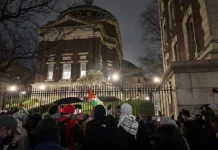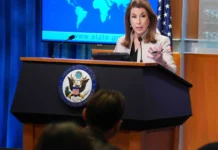Facebook founder and CEO Mark Zuckerberg thinks he’s found a way to avoid further skewering at the hands of those looking for a whipping boy for the failings of the Internet. Actor Sacha Baron Cohen scorched him last fall for running what he called “the greatest propaganda machine in history” because of the site’s willingness to take both ads that some deem either hateful or false. Cohen said the social-media entrepreneur’s refusal to adequately police Facebook was the equivalent of giving Nazis free reign to act as they liked.
Nor was the “Borat” star the only one to attack Zuckerberg for a position that was profitable but allegedly morally questionable. He was hauled before Congress in 2018 to account for questions about the way the privacy of the billions of Facebook users is abused, as well as for the fact that Russian bots purchased ads on it during the 2016 presidential election. The questionable decisions of the 20,000 “content moderators” who seem to be more inclined to take down content posted by conservatives than the ones placed by liberals was also called into question.
Determined to act in a manner that protects his ability to monetize a forum that is, for all intents and purposes, the modern public square, Zuckerberg has sought a way to escape both scrutiny and responsibility. And with the announcement of a new Facebook oversight board, he thinks he’s found the answer.
The question now is whether this board is a solution to the knotty problems of free speech on social media or a committee that may make an already troubling situation far worse.
Its statement of purpose claims that its goal will be to “support people’s right to free expression and ensure those rights are being adequately respected.” Zuckerberg has also pledged not only to respect their independence (no one on the board can be fired by him or his corporate board) and the decisions they make “to uphold or reverse Facebook’s content decisions will be binding, meaning Facebook will have to implement them, unless doing so could violate the law.”
That gives the 20 individuals who were named to this body enormous power. While Facebook has clearly sought to create as diverse a group as possible—with many from Third World countries, as well as Americans with backgrounds in the law and on free-speech issues—it is hardly surprising that questions would be raised about the worthiness, objectivity and personal agendas of these members.
The first to come under scrutiny is Tawakkol Karman, a Yemeni journalist, politician and activist who has the distinction of being the first Arab woman to win a Nobel Peace Prize. Karman won her Nobel for “non-violent struggle for the safety of women and for women’s rights to full participation in peace-building work,” as a result of her anti-government demonstrations during the Arab Spring protests of 2011.
That sounds laudable, though not everything on her résumé would lead one to think she’s the right person to decide whether any one of us can get “canceled” by Facebook. Karman is a leader of a Yemeni political party that is linked to the Muslim Brotherhood terrorist movement. As such, she is a hard-core Islamist who believes that governments should impose radical Islam on those under their power.
Though Karman claims to be an advocate for freedom in Yemen, it’s hard to believe that she can be counted on to protect the rights of secular persons, especially when Muslim sensibilities are involved. Indeed, it’s impossible to imagine her defending the right of anyone to post articles or pictures—think of the Danish newspaper that published cartoons about the Prophet Muhammad—that would be considered blasphemy in the Muslim world.
Looking beyond Karman, the board also includes one Israeli: Emi Palmor, the former director general of the Jewish state’s Justice Ministry, who was fired from that job by one of Prime Minister Benjamin Netanyahu’s loyalists.
Balancing any defense of Zionism from Palmor will be Nighat Dad of Pakistan. Dad is a lawyer and an advocate for women’s rights, but also a bitter critic of the Jewish state who criticized Facebook for being insufficiently supportive of the rights of Palestinians to use social media to incite hatred against Jews.
There are a number of distinguished figures from the world of the law and journalism on the board. Among them are left-wingers like Pamela Karlan, a former Obama administration staffer, Stanford University law professor and a bitter opponent of President Donald Trump, as well as former Danish Prime Minister Helle Thorning-Schmidt. John Semples of the Cato Institute will represent the views of libertarians. Former appeals-court judge Michael McConnell is a mainstream conservative and Columbia Law professor Jamal Greene is a member of the Federalist Society, which has helped guide Trump’s judicial nominations.
Were the members of the oversight board all part of a spectrum of belief that embraced mainstream American views about free speech, we might have confidence that its decisions could be just or at least defensible. But there is no bridging the gap between a Muslim Brotherhood sympathizer and someone who thinks that anti-Semitic incitement is kosher with conventional American liberals and conservatives.
By creating a body that includes opponents of free speech, Facebook has reminded us that all efforts at censorship—even the most well-meaning—are inherently problematic. Zuckerberg may think he has gotten himself off the hook by off-loading decisions to an unaccountable board. But we should tremble for the future of liberty when people like Karman or even more reputable persons are given the power to suppress opinion, whether good or bad, that may run afoul of fashion or political correctness.


























